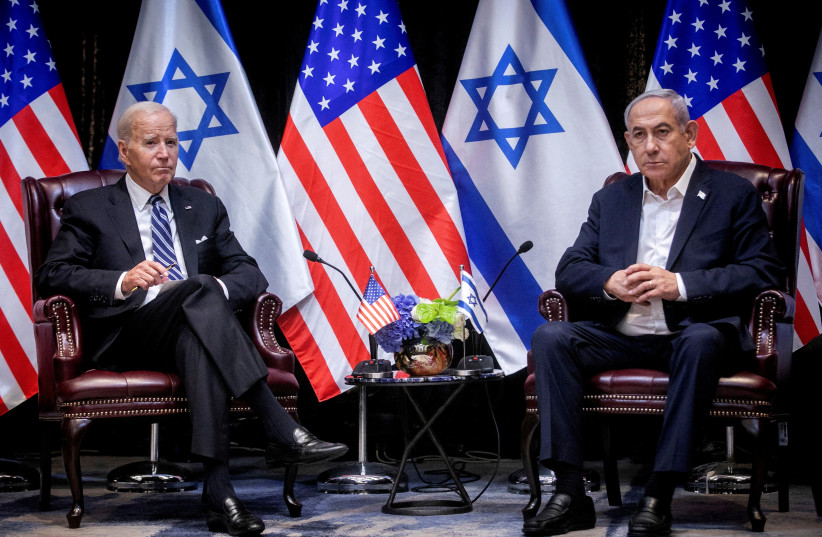The politics is getting out of control, and the question is whether it puts the fate of the hostages and the objective of defeating Hamas at risk.
White House officials insist that they were taken aback by Prime Minister Benjamin Netanyahu’s announcement that he was calling off a trip to Washington by a delegation headed by National Security Adviser Tzachi Hanegbi and Strategic Affairs Minister Ron Dermer, after the US refused to thwart a UN Security Council resolution which called for an immediate ceasefire in Gaza.
The Biden administration is familiar with the players in Netanyahu’s circle. Hanegbi and Dermer, the latter in particular, are the prime minister’s people. US officials acknowledge that with this decision to call off the trip, Netanyahu was “putting his foot down,” feeling increasing heat personally from the administration over how he is running Israel’s affairs.
“Minister Benny Gantz was here earlier this month, Defense Minister Yoav Gallant is here now, [and] the defense establishments are in constant contact,” a White House aide argued. “Calling off the Hanegbi-Dermer delegation is political window dressing by the prime minister.”
In response to the question of whether the administration was also acting politically – by supporting Israel but looking over its shoulder amid the president’s re-election campaign to make sure it didn’t alienate its electorate too much – a White House aide insisted: “Israel has no better friend than the Biden administration, in general – and regarding Gaza, in particular.”

On the one hand, the aide seemed to be charging that Netanyahu was not sufficiently appreciating the administration’s obstacle course in navigating its policy regarding Gaza, and that calling off the visit to Washington by his delegation only exacerbated the public impression “that the two countries are not on the same side.” On the other hand, the aide reiterated that “on the ground, our cooperation is not affected.”
Biden on Netanyahu's governance
In a recent MSNBC interview, President Joe Biden charged that Netanyahu was doing more harm than good; he has also publicly questioned Israel’s plans for a Rafah operation. However, a White House aide insisted that the president’s endgame remains “the defeat of Hamas.” Yet, regarding Hanegbi and Dermer staying home, instead of visiting Washington at least right now, administration officials seem fine with holding high-profile contacts in the US capital with high-level Israeli officials who themselves have tense relations with Netanyahu.
The president and his people are aware of domestic issues in Israel, including the resistance by Gallant and Gantz to Netanyahu’s moves on the matter of haredi (ultra-Orthodox) enlistment in the IDF.
Within the Biden administration, there isn’t totally smooth sailing either. Officials have acknowledged that Vice President Kamala Harris has been the “weak link” in support for the Israeli campaign in Gaza. Yet, said one official, “she is toeing the line and in principle supports what the Israeli mission is all about,” even if her pronouncements at times “seem more blunt about what Israel is doing wrong.”
Biden has stronger support for his Gaza policy, say aides, from Secretary of State Antony Blinken, Defense Secretary Lloyd Austin, and National Security Advisor Jake Sullivan. Some aides seem to hint that having Harris playing “bad cop” with some of her declarations on Israel allows Biden to hope he can placate those who say they would vote for him in November, but are threatening not to do so over what some even call his support for “genocide.”
“Listen, the [UN] Security Council called for a ceasefire, but it also called for a release of the hostages,” argued a Biden aide. “We have not abandoned Israel, [and] we have not abandoned the Israeli mission in Gaza. We have also not abandoned the need for humanitarian aid and working toward the overall well-being of Palestinians in Gaza.
Cooperation is key - but difficult in attaining
“The question is what is the best way to achieve all these goals; it is challenging,” the aide said. “We want to work with the Israelis. We want to work with them on how to achieve victory over Hamas in general, and how best to achieve the aims of a Rafah operation in particular, but not in a way – as both the president and vice president have said – that would lead to a civilian bloodbath. And yes, we want the return of the hostages.”
Biden’s re-election campaign advisers continue to watch the Gaza policy closely. The president is said to be feeling the heat over warnings he is receiving that he has a very thin tightrope to walk on: promoting his policy but not risking defeat in November. “Gaza is not the only reason for concern,” conceded a Biden political adviser, “but it’s a big reason.”
Netanyahu’s announcement – calling off the visit by the Hanegbi-Dermer delegation to Washington to discuss Rafah policy and how to release the hostages – came as the prime minister was battling for his political life, warning coalition naysayers to the proposals regarding haredi military recruitment that if an agreement is not reached, the government would fall.
So apparently, the US and Israeli landscapes both currently abound with political window dressing by the two leaders, Biden and Netanyahu. Such behavior is not rare in the political world, but right now, if these maneuvers by the president and prime minister do in fact get out of control, the ramifications could be extremely dangerous and deadly.
The writer is op-ed editor of The Jerusalem Post.
